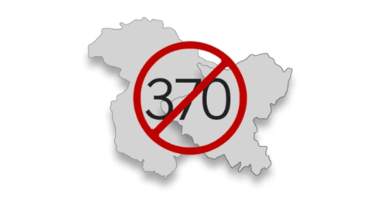Decoding the abrogation of Article 370 Impact & Debates
Abstract
article 370 which provides special status to the state of Jammu and Kashmir has been a topic od debate for a long time. On August 2019, the Indian government repealed article 370 which was a groundbreaking decision which basically means taking out all the special rights and privileges which was given under article 370 to the state of Jammu and Kashmir for more than 70 years. multiple opinions were expressed regarding this.while some people argued that it was a good decision to further integrate Jammu and Kashmir into India, others argued that it violates the state’s right and public wants.this aricle will talk about the effects resulting from the removal of article 370, the arguments arosed out of it and what it might mean for the region and the whole country.
Introduction
Article 370 was an issue of great importance, especially because it was repealed in 2019.as a result numerous changes were taking place in the region. However to understand the reason behind its controversy let’s first understand the importance of article 370.
Article 370 which was granted by the Indian constitution provides special status to the state of Jammu and Kashmir that gave power to the state to have its own rules, laws, flags and control over the internal affairs of the state while it kept the control of central government over the defence, foreign affairs etc. This special status as like a framework for how the Jammu and Kashmir and the rest of India worked together.
Over the time the disagreement regarding article 370 started arosing, people claimed that it prevents Jammu and Kashmir from fully being a part of India they said that it is providing many special rules and privileges to the region which makes it different from the laws applied to the rest of the parts of India.
Others thought that it is important as it gives special recognition to the state and allowed the local public to make their own decisions.
Then in 2019, the decision of revocation of article 370 made a lot of people react, not only within the state but all over the world, it sparked a number of debates and reforms that are still a matter of discussion in politics.
Historical context
The rise of article 370 was taken place when maharaja Hari singh ,the ruler of Jammu and Kashmir that time acceded to India in 1947 in order to protect the state from the attack of Pakistan. The instrument of accession was signed in October 1947 between the ruler and the central government which states that for any amendment in the state it will require the consent of the central government as it provides protection to the Jammu and Kashmir state’s right by applying Indian constitution temporarily.
Article 370 was temporarily enacted till the constituent assembly of Jammu and Kashmir drafted and formulated its own constitution on November 17,1956. It was continued in action by providing special status to the state until its abrogation on august 5,2019.
Unpacking the abrogation
The decision to abrogate the special status of Jammu and Kashmir has sparked discussion.in august 2019, under the leadership of prime minister Narendra modi article 370 was abrogated to promote unity and integration it was claimed that the progression and advancement of laws were hampered in the region because of the special status. However, it also sparked protests and criticism. The decision raised concerns about the impact on rights and identity in Jammu and Kashmir.it was crucial to moniter and keep eyes on the developments of the state with the special status after its abrogation it redefined the central government’s relationship with Jammu and Kashmir, shaping the socio-political landscape.
outcomes for Jammu and Kashmir
Political, social, and economic ramifications- the abrogation of article 370 transformed Jammu and Kashmir politically, socially, and economically. Earlier the states having its own laws and now it is completely integrated into the Indian union.
Reaction differs in social contexts. While some view the action as promoting equal rights while others express their concern about the cultural identity and demographic changes. There are issues with representation and governance arising from the division into two union territories
Economically the abrogation helps to generate avenue for investments and developments.
Disputes over the abrogation: legal and constitutional discussions
It was a controversial legal and constitutional issue to repeal article 370. Critics argued that it goes against the federal values and democratic structure of the constitution raising question on its legality. Additionally, the opponents argued that it is hampering the rights and freedom of local people and the demographic structure and culture of the region.
The abrogation is getting global implications, human rights organizations are taking notice of the abrogation which has worldwide ramifications and strains diplomatic ties.
A year after the abrogation: assessing the impact
The historical repeal of article 370 has sparked the ongoing discussions about how it has affected the Jammu and Kashmir politically a year later, the decision faced mixed reactions because of which the discussions and debates continued.
The region underwent significant administrative and governmental transformations before splitting into two distinct union territories.
An objective evaluation is essential, taking into account the state of growth, the return of normality, political changes & general wellbeing. Forging a path towards long term peace, stability & economic growth in Jammu & Kashmir requires an open discourse, taking into account different view points and overcoming challenges.
The road ahead: challenges and possibilities
The revocation of Article 370 has sparked discussions, debates & conflicts as the region moves forward, assessing the road ahead reveals challenges and possibilities. Immediate peace and stability must be restored while addressing a variety of societal viewpoints.
Resolving past militancy and insurgency is essential for development
It is essential to make sure that the opinions of people are recognized and given voice through meaningful discussions. Despite challenges, promising possibilities exist particularly in the fields of tourism, agriculture and renewable energy. Greater integration offers cultural and economic benefits. Although there will be obstacles in the way, advancements and prosperity can be attained by resolving issues, encouraging developments, ensuring securities and fostering integration.
Important case laws
Article 370 under Part XXI of the Constitution is temporary and subject to modification by constituent assembly of J&K. its temporary nature is the result of the instrument of Accession which is signed b/w the king Hari Singh and the Central government.
- Kumari Vijaylaxmi Jha v. UOI, 2017- the Delhi HC dismissed claims that its continuation was fraudulent and the Supreme Court in April 2018 stated that despite its temporary title, Art. 370 is not a temporary provision.
- Premnath Kaul v. State of J&K, 1959- the court emphasized evaluating its effect and application based on the constitutional relationships is unique feature. The provision’s essence lies in determining the state country relationship by the state constituent assembly.
Conclusion
One of the biggest movements in Indian history, the repeal of Art. 370 sparked strong opinions and heated discussions reflecting on its long term implications. It is evident that the goal of achieving equality of opportunity and national unity is moving closer to J&K full integration into the Indian Union.
While supporters anticipate development and prosperity, critics express about loss of identity and sovereignty. The complexities are increased by the complex concerns and diplomatic strains. The long term effects are yet to fully unfold, emphasizing the governments responsibility for effective governance, addressing people’s concern and promoting peace.
It is essential for us as citizens to have educated conversations, appreciate different point of view and supporting inclusive initiatives. The abrogation opens a new chapter in the history of Jammu & Kashmir requiring empathy, wisdom and a commitment to everyone’s wellbeing.
Author:- Jaahnavi Mishra, in case of any queries please contact/write back to us at support@ipandlegalfilings.com or IP & Legal Filing.
References
- https://www.thehindu.com/news/national/the-historic-shift-in-jammu-and-kashmirs-status-explained/article67635628.ece#:~:text=On%20December%2011%2C%202023%2C%20the,it%20of%20its%20special%20privileges
- https://www.scobserver.in/cases/challenge-to-the-abrogation-of-article-370-case-background/
- https://www.drishtiias.com/daily-updates/daily-news-editorials/article-370-decoding-the-supreme-court-verdict
- https://www.legalserviceindia.com/legal/article-5435-article-370-of-the-constitution-of-india.html



